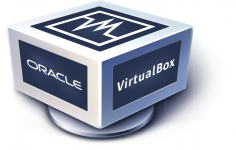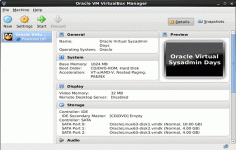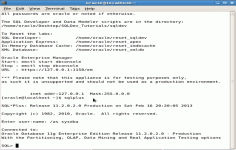 VirtualBox 1.6.0
VirtualBox 1.6.0
Oracle - (Open Source)
VirtualBox is an easy and elegant solution for those who want to control a computer from another computer.
VirtualBox offers virtualize your operating system (OS) guests on a host machine. Called hypervisor, the application supports Windows OS X, Linux, Mac, Solaris, FreeBSD, etc.. as host, Mac OS X missing the call as a guest.
It also includes a remote access via HTTP protocol, convenient for demonstrations on a clean system. The ability to manage multiple states of the system is particularly interesting and its interface is very simple.
Virtualization solutions allow installing an operating system on a virtual machine using the resources of the host PC , thus enjoying very good performance. In the genre, several solutions are known for their ease of use, such as VMware Workstation , Parallels Desktop or Microsoft Virtual PC 2007 SP1.
A virtual machine is a useful way to use two operating systems simultaneously and harmless to the host computer. There is the possibility to install Linux on a virtual machine on Windows and vice versa .
- Title:
- VirtualBox 1.6.0
- File Size:
- 21.3 MB
- Requirements:
- Windows XP
- Language:
- en-us
- License:
- Open Source
- Date Added:
- 02 May 2008
- Publisher:
- Oracle
- Homepage:
- http://www.oracle.com
- MD5 Checksum:
- 73C8918A8D71636CF0082C8731B29A49
This version is the first major update since being acquired by Sun.com. The following major new features were added:
* Solaris and Mac OS X host support
* Seamless windowing for Linux and Solaris guests
* Guest Additions for Solaris
* A webservice API
* SATA hard disk (AHCI) controller
* Experimental Physical Address Extension (PAE) support
In addition, the following items were xed and/or added:
* GUI: added accessibility support (508)
* GUI: VM session information dialog
* VBoxHeadless: renamed from VBoxVRDP
* VMM: reduced host CPU load of idle guests
* VMM: many xes for VT-x/SVM hardware-supported virtualization
* ATA/IDE: better disk geometry compatibility with VMware images
* ATA/IDE: virtualize an AHCI controller
* Storage: better write optimization, prevent images from growing unnecessarily.
* Network: support PXE booting with NAT
* Network: xed the Am79C973 PCNet emulation for Nexenta guests
* NAT: improved builtin DHCP server (implemented DHCPNAK response)
* NAT: port forwarding stopped when restoring the VM from a saved state
* NAT: make subnet congurable
* XPCOM: moved to libxml2
* XPCOM: xed VBoxSVC autostart race
* Audio: SoundBlaster 16 emulation
* USB: xed problems with USB 2.0 devices
* MacOS X: xed seamless mode
* MacOS X: better desktop integration, several looknfeel xes
* MacOS X: switched to Quartz2D framebuffer
* MacOS X: added support for shared folders
* MacOS X: added support for clipboard integration
* Solaris: added host audio playback support (experimental)
* Solaris: made it possible to run VirtualBox from non-global zones
* Shared Folders: made them work for NT4 guests
* Shared Folders: many bugxes to improve stability
* Seamless windows: added support for Linux guests
* Linux installer: support DKMS for compiling the kernel module
* Linux host: compatibility xes with Linux 2.6.25
* Windows host: support for USB devices has been signicantly improved; many additional USB devices now work
* Windows Additions: automatically install AMD PCNet drivers on Vista guests
* Linux additions: several xes, experimental support for RandR 1.2
* Linux additions: compatibility xes with Linux 2.6.25
Related software
0.1/5 from 1120 users


